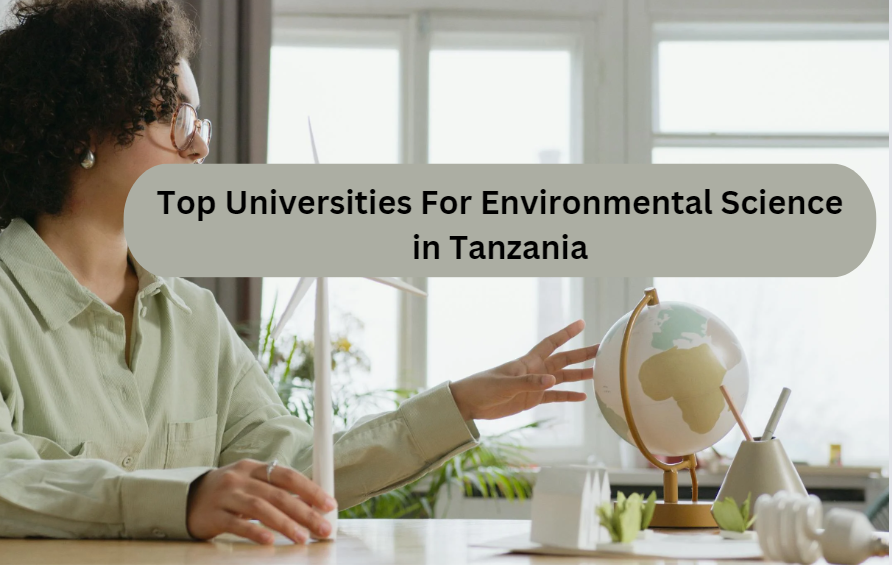
Top Universities For Environmental Science in Tanzania; Choosing the right university for pursuing a degree in Environmental Science is crucial for aspiring students in Tanzania. Several institutions offer top-notch programs that focus on sustainability, conservation, and environmental management. These universities not only provide academic excellence but also engage in significant research that addresses local and global environmental challenges.
Students interested in this field will find a variety of options across Tanzania. Institutions like the University of Dar es Salaam and Ardhi University rank among the best for their research and program offerings. With a strong focus on both theory and practical applications, these universities prepare graduates to make meaningful contributions to the field of environmental science.
This blog post will explore the leading universities in Tanzania for Environmental Science and highlight what makes each one unique. By understanding these options, students can make informed decisions about their education and future careers.
Academic Programs and Research Opportunities
Tanzania offers a variety of academic programs and research opportunities in Environmental Science. These programs are designed to equip students with the necessary skills and knowledge to address environmental challenges. Each level of study presents unique learning experiences and practical involvement in real-world scenarios.
Undergraduate Programs
Undergraduate programs in Environmental Science typically focus on foundational knowledge and skills. These programs cover areas such as ecology, environmental policy, and resource management. Students engage in coursework that includes lectures, group projects, and field studies.
Institutions like Ardhi University provide specialized courses. They emphasize the sustainable use of natural resources and environmental conservation. The curriculum often incorporates practical labs and field trips, allowing students to gain hands-on experience with environmental data collection and analysis.
Masters and Doctoral Programs
Masters and doctoral programs in Environmental Science are more research-oriented. These programs focus on advanced topics such as climate change, environmental health, and ecosystem management. Students are usually required to complete a thesis or dissertation.
Institutions like the Open University of Tanzania offer a Master of Environmental Studies program. This program includes a blend of coursework and research, where students explore critical environmental issues. Doctoral candidates often collaborate with faculty on innovative research projects that contribute to local and global environmental solutions.
Research and Partnerships
Research in Environmental Science is crucial in Tanzania. Universities often collaborate with governmental and non-governmental organizations to address pressing environmental issues. This research can focus on biodiversity, sustainable development, and pollution control.
Many universities, including Ardhi University, actively engage in partnerships. These partnerships facilitate joint research initiatives, workshops, and community outreach programs. Such collaborations enhance the academic experience and provide students with opportunities to contribute to real-world environmental solutions.
Field Work and Practical Learning
Fieldwork is an integral component of Environmental Science programs. Students participate in various practical learning experiences, which may include internships, field studies, and community projects.
For example, undergraduate students often conduct environmental assessments in local communities. This hands-on approach allows them to apply theoretical knowledge. They learn to identify environmental challenges and suggest solutions based on their research findings.
The emphasis on practical learning prepares students for careers in various sectors, including conservation, policy-making, and research. This real-world experience is invaluable for building competencies and enhancing employability in the environmental field.
Final thoughts
Choosing a university for environmental science in Tanzania is an important decision. Students should consider various factors such as the school’s reputation, available programs, and research opportunities.
Many universities in Tanzania offer strong environmental science programs. They provide students with a solid foundation in the field. Institutions like the Open University of Tanzania stand out for their comprehensive curriculum, including both undergraduate and graduate programs.
Research performance is also crucial. Some universities have an impressive number of academic papers and citations. This indicates a healthy research culture. Prospective students may find it helpful to look at rankings and performance statistics.
Networking and internships are essential for practical experience. Many universities offer connections to local and international organizations. This can provide valuable opportunities for hands-on learning.
Finally, students should assess their own career goals. Certain programs may align better with specific aspirations in environmental fields. Evaluating personal interests alongside university offerings will lead to more fulfilling educational experiences.
In summary, students have a variety of strong choices in Tanzania. A careful selection process will ensure they find the right fit for their educational and career ambitions.
Also Read;
- Top Universities For Liberal Arts and Social Sciences
- 2024 Top Universities For Nursing Courses in Tanzania: Full Guide
- Top Paying Jobs in Tanzania 2024/2025: Opportunities for Professionals
- Top &Best Ranking Universities in Tanzania 2024-2025
- 15 Best Medical Schools in Tanzania: Top Ranking Institutions 2024
- Top Universities for Information Technology(IT) in Tanzania 2023/2024: Full Guide

